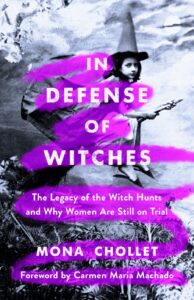
Mona Chollet, In Defense of Witches
I think In Defense of Witches by Mona Chollet (translated by Sophie R. Lewis) was the first book I read in 2022, and it started off my year in a lovely mood. Chollet is a Swiss intellectual who writes in a breezy, sophisticated, page-turning way that has made her very well-known in France. I always feel as though I’m in a petit Parisian café when I read her books. She discusses the attributes which once led to women being accused of witchcraft, and then links them to ways in which women are still hounded today. It’s a fun read because you can’t help but identify with the witches she describes, and as you read it you declare, Yes let me get old and cantankerous and outspoken, these are modern times, after all.
–Heather O’Neill, author of When We Lost Our Heads
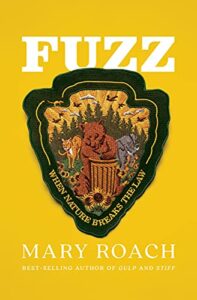
Mary Roach, Fuzz: When Nature Breaks the Law
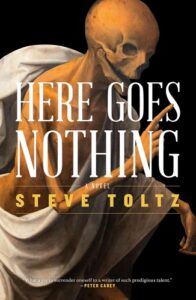
Steve Toltz, Here Goes Nothing
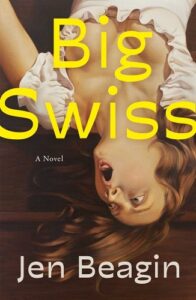
Jen Beagin, Big Swiss
As a practicing animal fact enthusiast who tries to commit one small crime everyday, I took tremendous pleasure in Mary Roach’s Fuzz: When Nature Breaks the Law—an unpretentious, hilarious, informative accounting of animal “crimes” and the forensics involved in solving them. If fiction’s your thing, look no further than Steve Toltz’ latest Here Goes Nothing—a dark and raucously funny novel about a dude murdered by a man in love with his pregnant wife, narrated from an afterlife as equally confounding as, well, life. It’s rad, and you should read it.
I also just finished an ARC of Jen Beagin’s third offering, Big Swiss, out in February. It centers around a sex therapist’s transcriptionist who falls in love with a client while listening to her sessions. Yes and YES!
–Matt Sumell, author of Making Nice: Stories

Olivia Laing, Everybody
This year I had an accident and broke my knee in a bad way. I was stuck inside a very rigid body for a long time, grappling with variations of pain, struggling with inner voices that oscillated from “I can do this” to “I will never heal.” Sometime along the way an editor friend recommended Olivia Laing’s Everybody to me and I was transfixed. I had difficulty focusing at the time and couldn’t manage to get to the bottom of anything, but this book leaped out demanding to be considered in every detail.
It was like an oracle, speaking directly to everything I was going through. Susan Sontag, Kathy Acker, Ana Mendieta, Nina Simone, Malcolm X. To read about their bodies, political, physical, artistic, free, while confined inside a broken one, felt like a small salvation. I think it was possibly a deeper and faster cure than the five hours of physical therapy I was putting myself through at the time.
–Chiara Barzini, author of Things That Happened Before the Earthquake
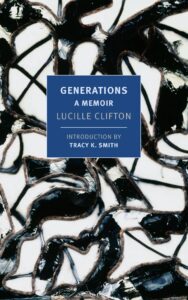
Lucille Clifton, Generations
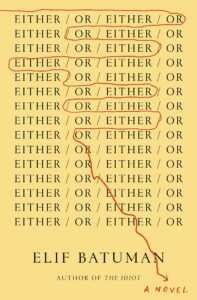
Elif Batuman, Either/Or
Last summer I read the poet Lucille Clifton’s Generations, a wonderfully looping, lyric memoir that is at once the story of her father’s death, a family tree and a family pantheon, and an excavation, really, of her family’s lineage as far back as it can be traced: to the first ancestor forced onto a ship and into enslavement in the U.S.A. This book incited the reaction only the best of books do: I wanted to hijack every conversation to talk about the book and assign it to all my students (which I did this past semester).
A few months later, I had a baby and was desperate for an intellectual romp—a book that required something substantial of my brain, but that moved swiftly enough to hold my quaky postpartum attention. I found it in Elif Batuman’s Either/Or (it got extra points for also being hilarious—a quality the postpartum period sorely lacks). I’ll be forever grateful to both of these books.
–Lauren Markham, author of The Far Away Brothers: Two Young Migrants and the Making of an American Life
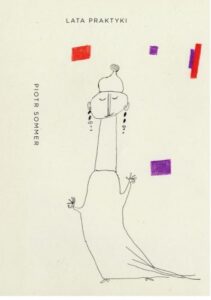
Piotr Sommer, Lata praktyki
Near the end of my first (and last) pregnancy, my vision declined to the point that I could no longer read books. Then my twins were born, and I recovered slowly, and for a couple of months, not being able to read didn’t seem to matter so much. Finally one morning the babies went to sleep, and I put on my mail-order glasses and read in one sitting the new book of poems by Piotr Sommer called Lata praktyki, which in English means Years of Practice.
Piotr Sommer is an icon in Poland, partly because he is that country’s greatest living poet, and partly because for nearly three decades he edited a revolutionary literary magazine called Literatura na świecie, or Literature in the World, that vastly expanded the purview of Polish and even Central European letters. Years of Practice, meanwhile, is a work of careful exuberance and casual, yet absolute, genius. It’s a collection about cities and families and the inexplicably meaningful nonsense of societies and social interactions. It’s about children and the irretrievable tomorrows of our childhoods. It’s about the joy of language, and it’s made up of the language of joy.
Sommer’s close relationship with English and the years he has dedicated to the art of literary translation have no doubt enhanced his appreciation of his native Polish, which I found contagious despite not having set foot in Poland in ages (or what feels like ages anyway). Lata praktyki isn’t translated yet, but Sommer’s translation, with Jennifer Grotz, of Jerzy Ficowski’s Everything I Don’t Know, also won this year’s PEN Award for Poetry in Translation and is readily available from World Poetry Books. Check it out if you can read and aren’t currently being screamed at.
–Jennifer Croft, writer and translator of The Books of Jacob by Olga Tokarczuk
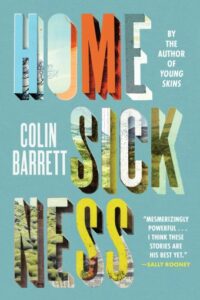
Colin Barrett, Homesickness
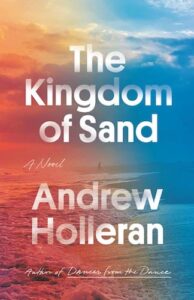
Andrew Holleran, The Kingdom of Sand
Nobody warned me how difficult reading other novels would be in the final stages of editing my debut novel. I failed to finish many good books. But there were two books that I read multiple times: the hilarious, upsetting Homesickness, by Colin Barrett and the extraordinarily beautiful The Kingdom of Sand, by Andrew Holleran. These two fucking miracles worked on me the way books used to when I was a child.”
–Kyle Dillon Hertz, author The Lookback Window, forthcoming in 2023 from Simon & Schuster
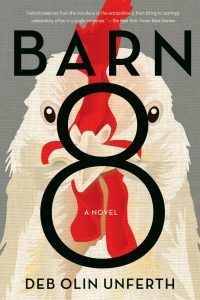
Deb Olin Unferth, Barn 8
In 2020, in anticipation of the end of the world, I bought a second refrigerator and placed several large orders from several small bookstores. This has created a backlog of books that has stretched all the way into 2022, when I finally chose Barn 8, by Deb Olin Unferth.
I’d passed it over a few times because of the chicken on the cover. Am I in the mood to read political stuff about chickens? Nah, maybe later. Then, cut to me, unexpectedly moved by a chicken making a promise.
–Shanteka Sigers is a writer whose work has appeared in Freeman’s, the Paris Review, Best American Short Stories and is a 2022 O. Henry Prize winner

Katherine Rundell, Super-Infinite, The Transformation of John Donne
In Super-Infinite, The Transformation of John Donne, Katherine Rundell’s prose makes us experience, with startling freshness, the familiar grounds of John Donne’s life. Her writing has both the devotional patience and alacrity of a conservator-restorer, that of someone who has spent many years up-close to Donne. As such, we believe her when she writes of an early portrait of Donne, that “his beauty deserved walk-on music, rock-and-roll lute: all architectural jawline and hooked eyebrows.” Shot through with a warm, generous spirit of loving attentiveness, Super-Infinite is the best companion to have when next rereading the work of this most mercurial of English poets.
–Ishion Hutchinson, author of House of Lords and Commons: Poems
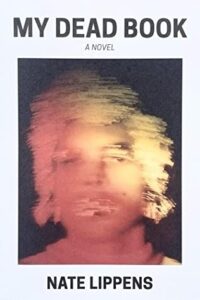
Nate Lippens, My Dead Book
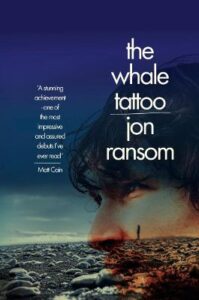
Jon Ransom, The Whale Tattoo

Fran Lock, White/Other
Three books from three dynamic indie presses that excited me this year were Nate Lippens’ beguiling My Dead Book, published in the UK by Pilot Press, The Whale Tattoo, the captivating novel by Jon Ransom from Muswell Press and the sublime White/Other by Fran Lock, from The 87 Press. Have I already read my book of 2023? Maybe—it’s going to be hard to top Kick the Latch by Kathryn Scanlan, coming early next year from Daunt.
–Andrew McMillan, co-editor (with Mary Jean Chan) of 100 Queer Poems: an Anthology
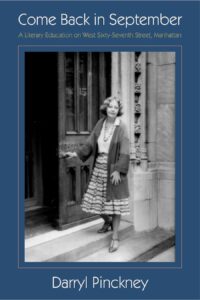
Darryl Pinckney, Come Back in September: A Literary Education on West Sixty-Seventh Street
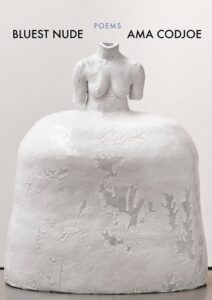
Ama Codjoe, Bluest Nude
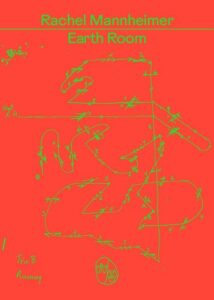
Rachel Mannheimer, Earth Room
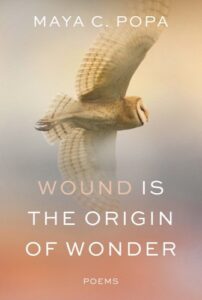
Maya C. Popa, Wound Is the Origin of Wonder
I’m caught up in Darryl Pinckney’s memoir of Elizabeth Hardwick, Come Back in September: A Literary Education on West Sixty-Seventh Street: it’s brilliantly told, and very funny, wit edged with pain (and social critique, character study, intellectual history, anecdote): “I said that sometimes life was so weird I was afraid to get up,” Pinckney recounts. “She said that life was often so strange to her she was too nervous to remain in bed.”
Life is strange, and made stranger and more arresting by these just-published collections of poems: Ama Codjoe’s debut, Bluest Nude; Rachel Mannheimer’s debut, Earth Room, and Maya C. Popa’s Wound Is the Origin of Wonder. Jay Hopler’s Still Life was published posthumously; an anticipatory elegy for the self— “my life’s a poem my death’s been writing for a long time”—it’s filled with the music of benediction and an earthy wild humor that doesn’t lighten but only deepens its beauty and sorrow.
–Catherine Barnett, author of Human Hours: Poems



